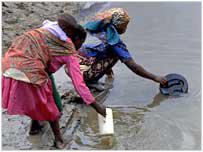The lack of water is an often insurmountable obstacle to helping oneself. You can’t grow food, you can’t build housing, you can’t stay healthy, you can’t stay in school and you can’t keep working.
Without clean water, the possibility of breaking out of the cycle of poverty is incredibly slim.
With unclean water sources often miles from villages, many of the able bodied members of a community are forced to spend hours each day simply finding and transporting water. The typical container used for water collection in Africa, the jerry can, weighs over 40 pounds when it’s completely full.
Imagine how demanding it would be to carry the equivalent of a 5-year old child for three hours every day. And some women carry even more, up to 70 pounds in a barrel carried on the back. That’s like carrying a baby hippo.
Wasted Time
The United Nations estimates that Sub-Saharan Africa alone loses 40 billion hours per year collecting water; that’s the same as a whole year’s worth of labor by France’s entire workforce! This is incredibly valuable time.
With much of one’s day already consumed by meeting basic needs, there isn’t time for much else. The hours lost to gathering water are often the difference between time to do a trade and earn a living and not. Just think of all the things you would miss if you had to take three hours out each day to get water.
When a water solution is put into place, sustainable agriculture is possible. Children get back to school instead of collecting dirty water all day, or being sick from waterborne illnesses. Parents find more time to care for their families, expand minimal farming to sustainable levels, and even run small businesses.
The social and economic effects caused by a lack of clean water are often the highest priorities of African communities when they speak of their own development. The World Health Organization has shown this in economic terms: for every $1 invested in water and sanitation, there is an economic return of between $3 and $34!
For often less than an average of $23 per person, The Water Project is able to work with local partners to provide closer access to clean water. Our goal is to bring clean, sustainable water supplies to within a 1km (1/2 mile) of a village. By doing so, communities can be freed to begin working themselves out of poverty.
When you give to help build a well, you’ll make sustainable agriculture possible. You will allow children to get back to school instead of collecting dirty water all day.
You’ll help father’s find more time to care for their family, maintain a farm, and even run a small business.
You can help break the cycle of poverty in Africa.
Please investigate how can you help?










